Facebook groups have helped me find roommates in Boston, potential dog breeders for a family pet, and women's networking opportunities in the nearby area.
In short: Facebook groups are undeniably valuable.
Recently, companies have taken advantage of groups for their own benefits, as well — Peloton, for instance, uses groups to connect its users and facilitate a space where people can share exercise plans, training methods, and workout schedules with one another.
Other brands, including National Geographic and Instant Pot, have followed suit, creating their own community-focused groups to inspire action, encourage engagement, and increase brand loyalty.
Even HubSpot recently created its own private group, Marketer to Marketer.
If you're considering creating a Facebook group for your own company, you'll want to keep reading. Here, we'll explore the differences between Facebook groups and Pages, how to create a Facebook group, and whether or not it's worth the effort.
Let's dive in.
Should I create a Facebook group for my business?
To determine whether a Facebook group is a good idea for your business, let's start with the differences between a Facebook group and a Facebook Page.
Most businesses should have a Facebook Page. A Page enables you to advertise on Facebook, and it's a public-facing profile to post company-relevant updates and announcements to Facebook users at-large.
If you're a nonprofit organization, a Page also enables you to post a 'Donate' button to increase donations from the Facebook community.
Considering 1.56 billion people are on Facebook, it's vital your business has a Facebook Page to increase brand awareness, advertise to new audiences, collect audience insights, and even chat with users looking for customer service.
As Gary Vaynerchuk told HubSpot's CEO Brian Halligan, "... You can't be alive in the game without a Facebook."
All of which is to say: Having a Facebook Page is a requirement for getting your business active on one of the largest social media platforms.
A Facebook group, on the other hand, is much smaller-scale and typically more exclusive than a Page. For instance, with a group, you're able to set up open membership, membership upon approval, or even membership by invitation only. Then, once members are accepted into your group, they're able to freely post and engage with one another.
Simply put, a Facebook Page is company-focused, while a Facebook group is community-focused.
A group is a good idea if you're interested in connecting your customers or leads to one another, you want to facilitate a sense of community surrounding your brand, or you're hoping to showcase your brand as a thought leader in the industry.
However, a group is not a good idea if you want to use it to raise awareness about your products or services, or simply use it to post company announcements.
People want to join groups in which they feel a sense of belonging and connection with fellow group members, and to learn about an industry at-large — which takes effort, resources, and time to ensure your team can deliver.
If you don't feel you have the resources to cultivate a valuable, engaging Facebook group, it might be best to wait until you do.
However, if you've determined a Facebook group is the right decision for your own business, let's explore how you can create one.
How to Create a Facebook Group for Your Business
1. On your company's Facebook homepage, click "Groups" on the left-hand side.
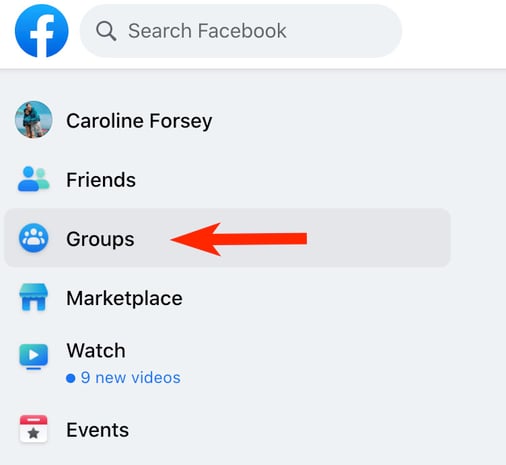
2. Click the "+ Create New Group".
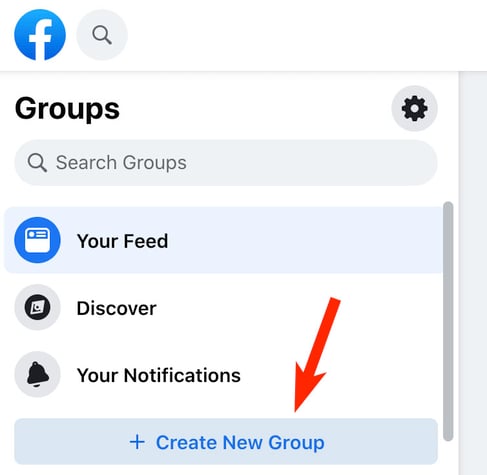
3. Type in a Group Name, and then choose your privacy (Public versus Private). You also have the option to invite Facebook friends immediately if you'd like. Then, click "Create".
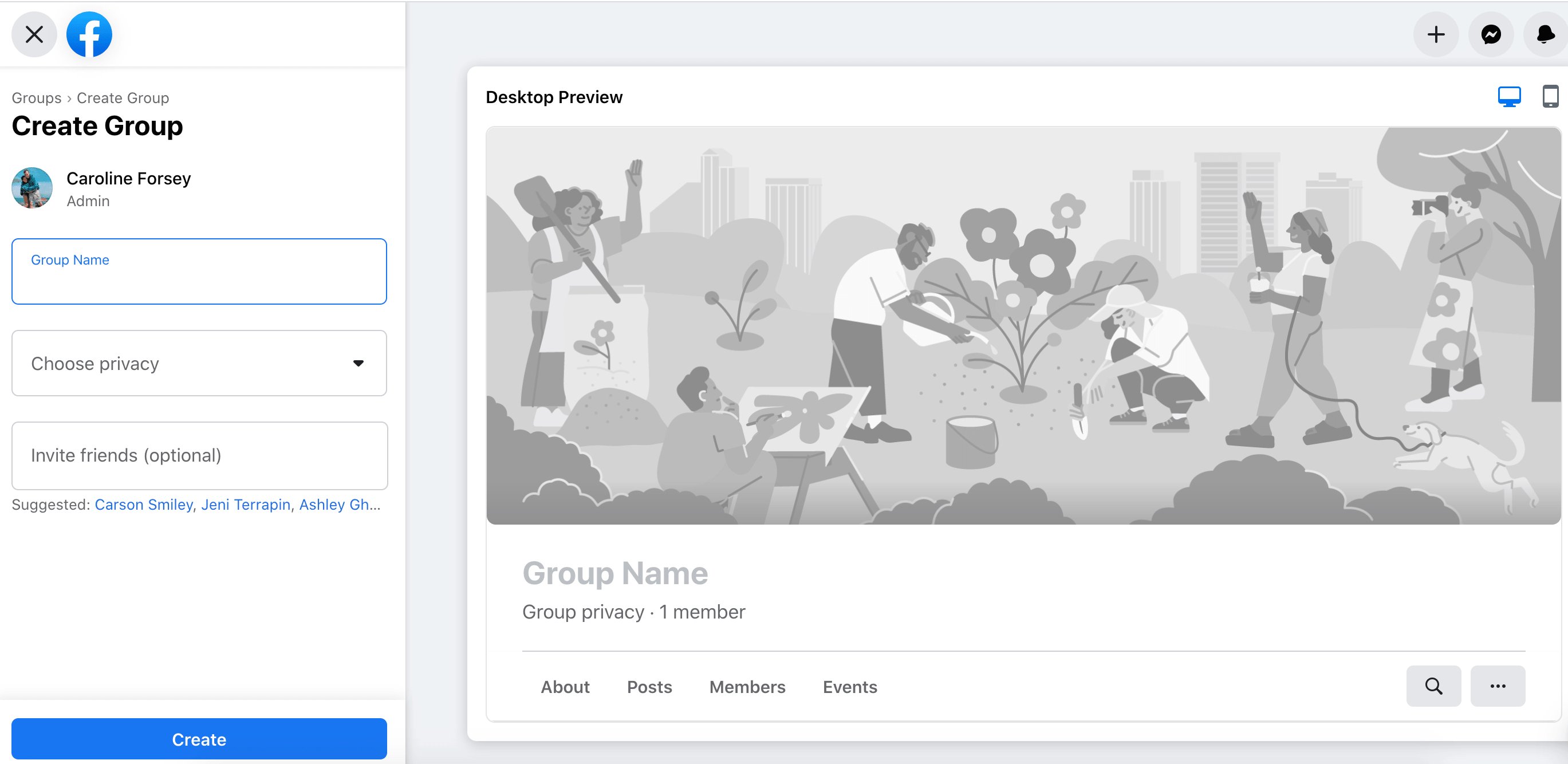
4. Click "Edit" on your cover photo to choose from Facebook photos, illustrations, or upload a photo from your computer.
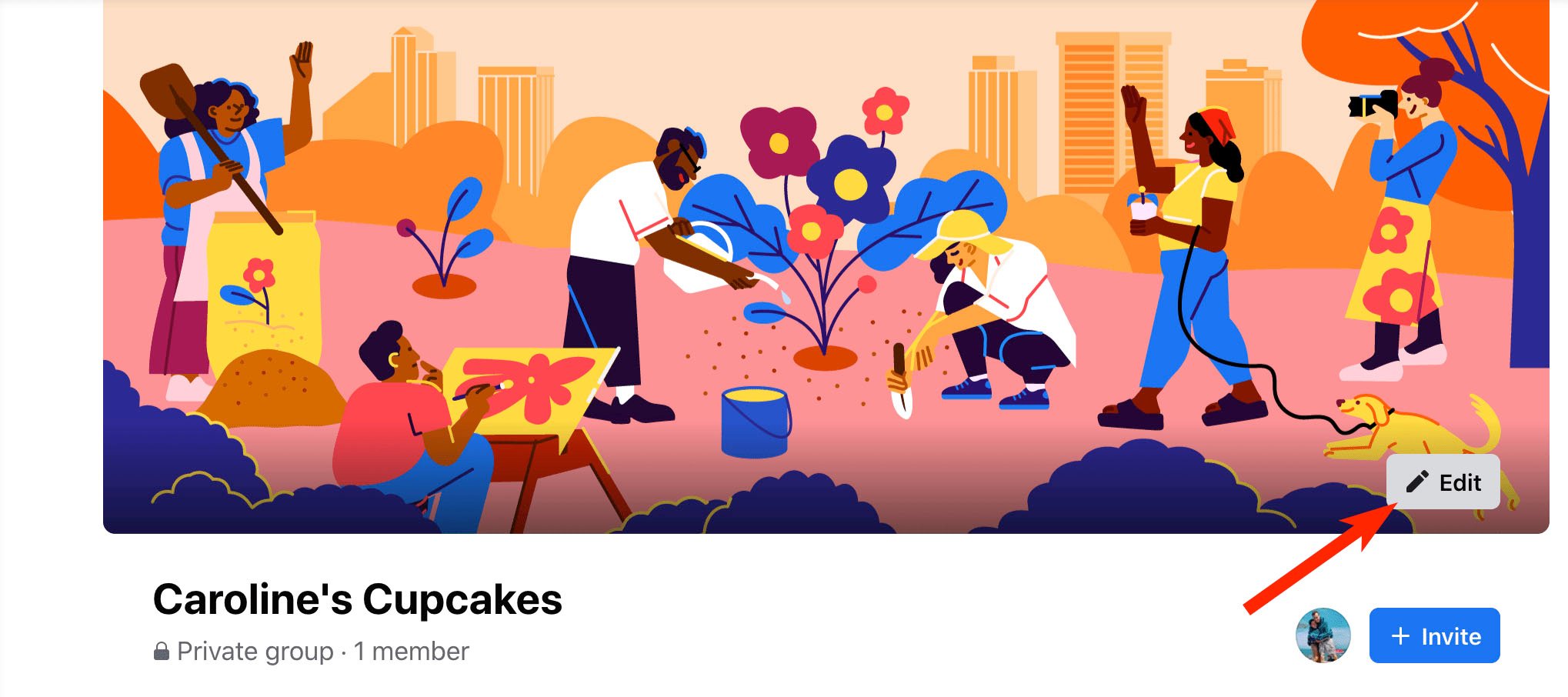
5. Add a description to your Group so people know what your group is about. Additionally, if you want to create a private group for customers, you can copy-and-paste customer email addresses into your "Invite" box.

And that's it! Your Facebook Group is now ready-to-go.
However, to encourage strong retention and engagement, you'll want to be an active community lead. To pin posts, create a poll in the group, and more, keep reading.
How to Pin a Post in a Facebook Group
A pinned post is a post that will remain at the top of your group's timeline for seven days (unless you unpin before then).
This is important if you've posted content to encourage engagement. For instance, if you've posted an Ask Me Anything, you might want to pin that post to ensure users can find it easily even once group members start posting their own content on the timeline.
Additionally, if you've posted to welcome new members to the community and provide some necessary information on your group, you might want to keep that post pinned to ensure new users have the right context as soon as they jump into your group for the first time (of course, you'll also want to provide context in your description, as well).
1. To pin a post, you'll first need to type your message into the "What's on your mind" box, and then click "Post".
2. Once the post is published, click the three dots at the top right of your post and select "Mark as announcement":
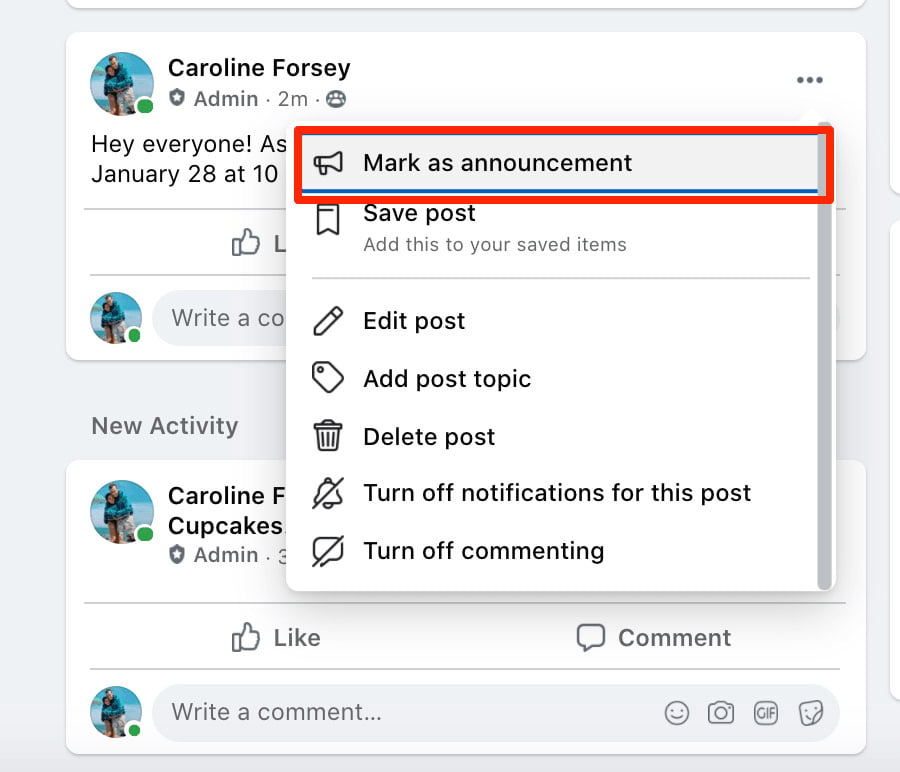 And that's it! Your post is now pinned to the top of your timeline for the next seven days.
And that's it! Your post is now pinned to the top of your timeline for the next seven days.
Next, let's dive into how you can create a poll in your new group.
How to Create a Poll in a Facebook Group
1. To create a poll in a Facebook group, start by clicking into the "What's on your mind?" box. Then, click on the three dots that say "More":
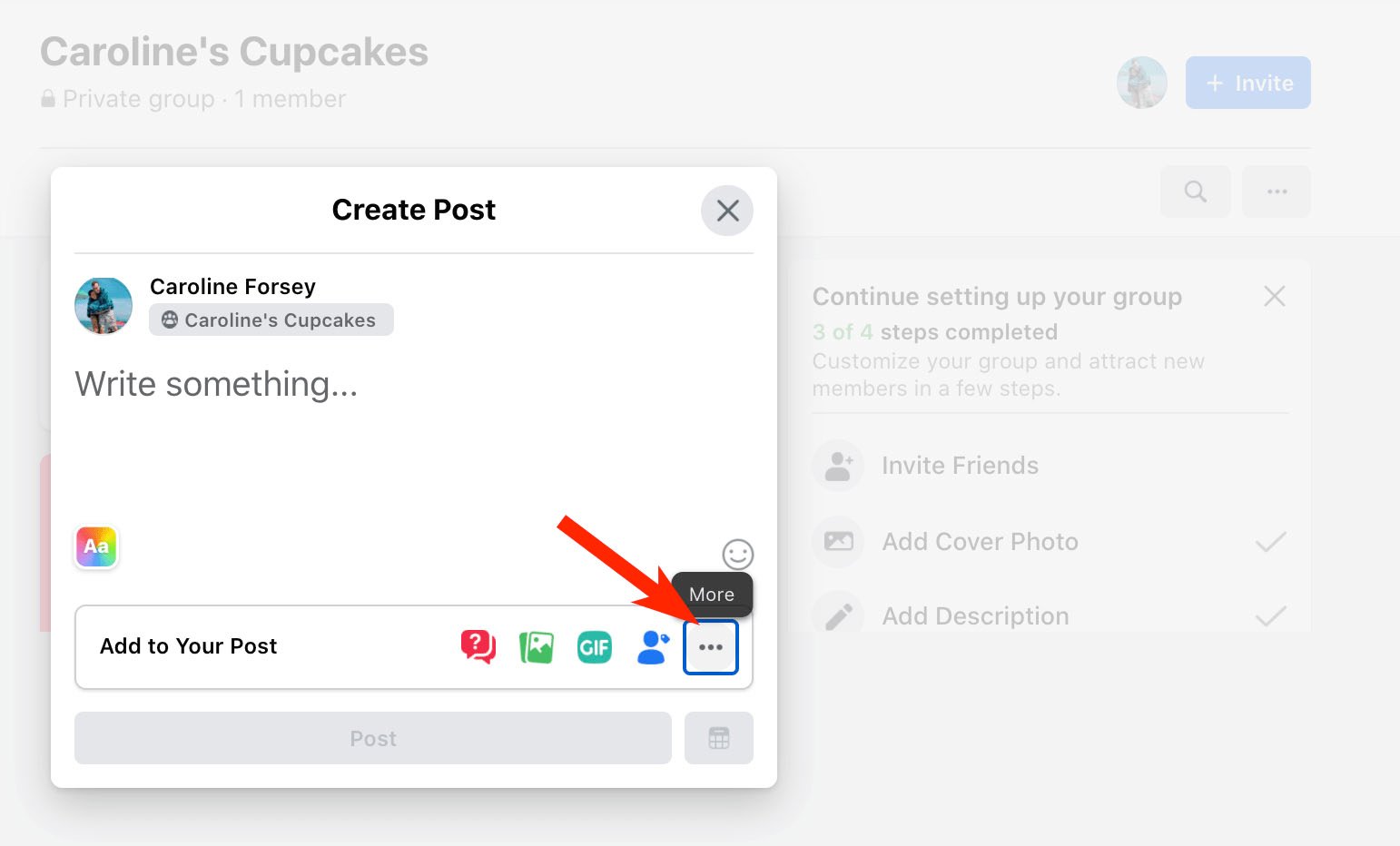
2. Next, click "Poll" out of your menu options.
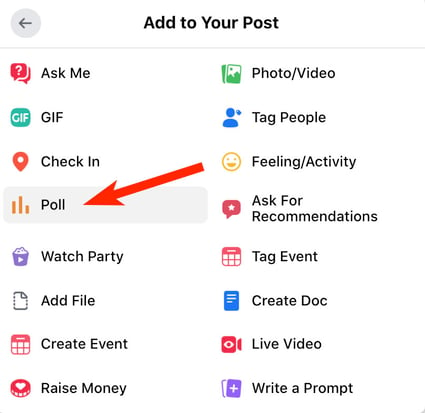
3. Type your poll question into the text space, and then add your individual options into each text box. Click "Poll options" to fine-tune your poll. When you're ready, click "Post" to immediately publish your poll.
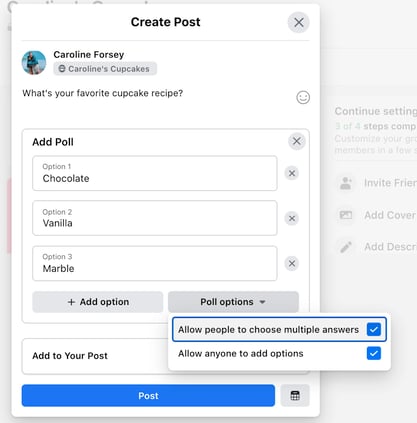
How to Create a Private Facebook Group
1. You have the option to create a Private or Public Facebook group when you're first creating a group:
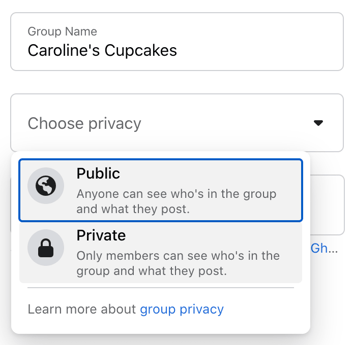 2. However, if you created a public Facebook group and now want to make it private, you can do that by clicking "Settings" under "Manage Group" (from within your group):
2. However, if you created a public Facebook group and now want to make it private, you can do that by clicking "Settings" under "Manage Group" (from within your group):
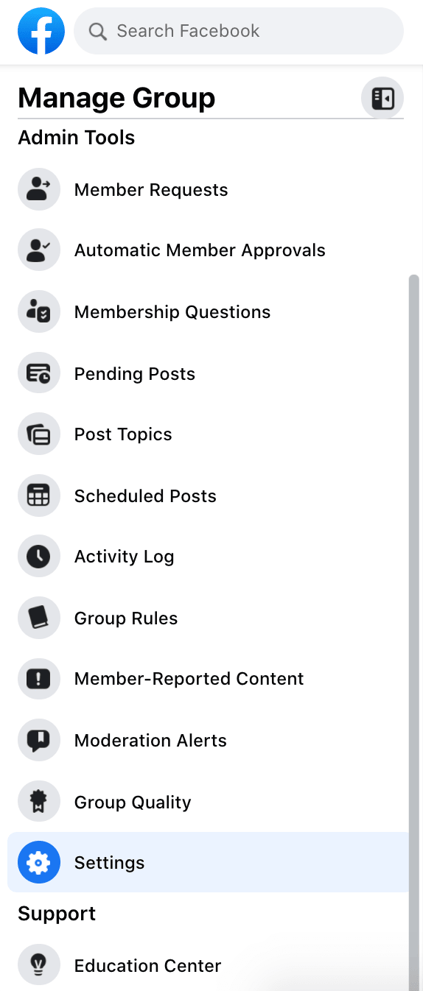 3. Next, click the pencil besides "Privacy" and click on the "Private" bubble (Note: It takes three days to change a group from public to private):
3. Next, click the pencil besides "Privacy" and click on the "Private" bubble (Note: It takes three days to change a group from public to private):
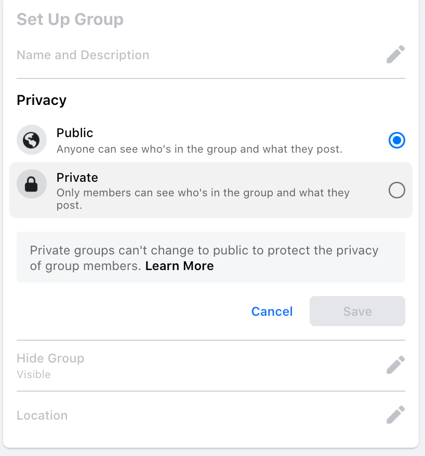 To learn more about the benefits of having a private Facebook group, read about how HubSpot made the decision to make its own private Facebook group — plus, why the social team feels the Facebook group is critical for faciliating deeper, more meaningful connections between HubSpot users and the industry as a whole.
To learn more about the benefits of having a private Facebook group, read about how HubSpot made the decision to make its own private Facebook group — plus, why the social team feels the Facebook group is critical for faciliating deeper, more meaningful connections between HubSpot users and the industry as a whole.
And that's it! You're now on your way to engaging with leads, prospects, or customers directly within your Facebook group to increase brand loyalty and value.
If you're looking for inspiration before designing your own Facebook group, take a look at 9 of The Best Facebook Groups We've Ever Seen.
from Marketing https://ift.tt/35XnsXw
via
No comments:
Post a Comment